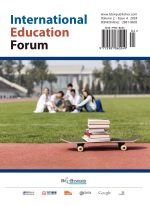Abstract
This paper reveals the influence of music education on D/deaf people’s hearing and speaking abilities by analyzing the existing literature. Firstly, the importance of music education and related research background is introduced. Then, some methods and precautions to be used in literature analysis are explained. In the literature review, the methodology, sample characteristics, and main findings of different studies are compared and analyzed. Lastly, the paper puts forward some suggestions for further research and summarizes the important role of music education in the field of D/deaf people education and the future research direction.
References
Váradi J, 2022, A Review of the Literature on the Relationship of Music Education to the Development of Socio-Emotional Learning. SAGE Open, 12(1): 215824402110685.
Darrow AA, Heller GN, 1985, Early Advocates of Music Education for the Hearing Impaired: William Wolcott Turner and David Ely Bartlett. Journal of Research in Music Education, 33(4): 269–279.
Darrow AA, 1993, The Role of Music in Deaf Culture: Implications for Music Educators. Journal of Research in Music Education, 41(2): 93–110.
Jones SK, 2014, Teaching Students with Disabilities. Update: Applications of Research in Music Education, 34(1): 13–23.
de Paula TRM, Pederiva PLM, 2017, Musical Experience in Deaf Culture. International Journal of Technology and Inclusive Education, 6(2): 1098–1102.
Rochette F, Moussard A, Bigand E, 2014, Music Lessons Improve Auditory Perceptual and Cognitive Performance in Deaf Children. Frontiers in Human Neuroscience, (8): 488. https://doi.org/10.3389/fnhum.2014.00488
Roman S, Rochette F, Triglia JM, et al., 2016, Auditory Training Improves Auditory Performance in Cochlear Implanted Children. Hearing Research, (337): 89–95.
Reifinger JL, 2018, Music Education to Train Hearing Abilities in Children with Cochlear Implants. Music Educators Journal, 105(2): 57–63.
Silvestre N, Valero J, 2005, Oral Language Acquisition by Deaf Pupils in Primary Education: Impact of Musical Education. European Journal of Special Needs Education, 20(2): 195–213.
Fix J, 2008, The Use of Music Education in Oral Schools for Children Who Are Deaf and Hard of Hearing, thesis, Washington University School of Medicine.
Nelson LH, Wright W, Parker EW, 2015, Embedding Music into Language and Literacy Instruction for Young Children Who Are Deaf or Hard of Hearing. Young Exceptional Children, 19(1): 27–38.
Harrison RV, Gordon KA, Mount RJ, 2005, Is There a Critical Period for Cochlear Implantation in Congenitally Deaf Children? Analyses of Hearing and Speech Perception Performance After Implantation. Developmental Psychobiology, 46(3): 252–261.
Moores DF, 2013, One Size Does Not Fit All: Individualized Instruction in a Standardized Educational System. American Annals of the Deaf, 158(1): 98–103.
